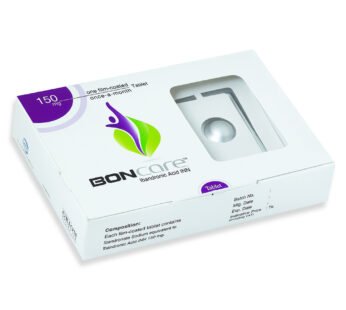Epitra 1 mg
Description
Indications
Epitra is prescribed for the treatment of panic disorder, with or without agoraphobia. Panic disorder is characterized by sudden, unexpected panic attacks accompanied by concerns about future attacks and their possible consequences.
Additionally, Epitra is used alone or as an adjunct therapy in managing Lennox-Gastaut Syndrome (a type of epilepsy), akinetic seizures, and myoclonic seizures. It may also be considered for patients with absence seizures (petit mal) who have not responded to succinimides.
The effectiveness of Epitra for long-term use beyond nine weeks has not been systematically evaluated in clinical trials. Physicians prescribing Epitra for extended periods should periodically reassess its continued benefits for each patient.
Pharmacology Clonazepam, the active ingredient in Epitra, belongs to the benzodiazepine class and exhibits anticonvulsant, sedative, muscle-relaxing, and anxiolytic properties. It enhances GABAergic neurotransmission at inhibitory synapses by increasing the receptor’s affinity for GABA, which enhances the inhibitory effect on the nervous system.
Animal studies suggest that clonazepam may also influence serotonin levels. Research, including EEG studies, indicates that clonazepam effectively suppresses various types of paroxysmal brain activity, including spike-wave discharges associated with absence seizures. It has demonstrated efficacy in managing both generalized and focal epilepsy.
Dosage & Administration
Oral Administration:
- Adults (Seizure Disorders): The initial dose should not exceed 1.5 mg/day, divided into three doses. The dosage can be increased by 0.5 to 1 mg every three days until seizures are controlled or side effects limit further dosage escalation. The maximum recommended dose is 20 mg/day.
- Adults (Panic Disorder): The initial dose is 0.25 mg twice daily. After three days, the dosage may be increased to a target dose of 1 mg/day.
- Pediatric Patients: For infants and children (up to 10 years or weighing up to 30 kg), the starting dose ranges from 0.01 to 0.03 mg/kg/day (not exceeding 0.05 mg/kg/day), administered in two or three divided doses.
Injection:
- Infants and Children: 0.5 mg administered via slow IV injection or infusion.
- Adults: 1 mg via slow IV injection or infusion, with repeat doses as needed (1-4 mg is generally sufficient). The injection rate should not exceed 0.25-0.5 mg per minute, and the total dose should not exceed 10 mg.
Interactions Epitra does not appear to significantly affect the metabolism of phenytoin, carbamazepine, or phenobarbital. However, its effect on other drugs has not been extensively studied.
Contraindications Epitra should not be used in patients with hypersensitivity to benzodiazepines or those with significant liver disease. It is safe for use in patients with open-angle glaucoma receiving proper treatment but is contraindicated in acute narrow-angle glaucoma.
Side Effects Common side effects include drowsiness (seen in 50% of patients), ataxia (30%), and behavioral changes (25%). Other possible effects include abnormal eye movements, tremors, confusion, hallucinations, insomnia, depression, psychosis, and palpitations.
Pregnancy & Lactation Epitra may pose a risk of congenital malformations. While anticonvulsants have been linked to birth defects, the exact contribution of each drug is unclear. It should only be used during pregnancy if the benefits outweigh the risks. High doses in the third trimester or during labor can lead to neonatal complications such as irregular heart rate, low muscle tone, mild respiratory issues, and feeding difficulties.
Clonazepam passes into breast milk in small amounts. Women undergoing treatment should avoid breastfeeding or discontinue the medication if breastfeeding is necessary.
Precautions & Warnings
- In patients with multiple seizure types, Epitra may increase the frequency of generalized tonic-clonic seizures, necessitating adjustments to anticonvulsant therapy.
- Combining Epitra with valproic acid may lead to absence status epilepticus.
- Pediatric patients may experience increased salivation and bronchial secretions, requiring airway management.
- Elderly patients may be more sensitive to benzodiazepines, necessitating dosage adjustments.
- No dosage adjustments are required in renal impairment, but caution is advised in hepatic impairment due to altered plasma protein binding.
Overdose Effects Symptoms of overdose include drowsiness, impaired coordination, slurred speech, abnormal eye movements, confusion, and, in severe cases, coma and respiratory depression. Management includes vital sign monitoring, supportive care, and, if necessary, administration of flumazenil as a benzodiazepine antagonist under close supervision.
Therapeutic Class Epitra belongs to the benzodiazepine class, serving as an adjunct anti-epileptic medication.
Reconstitution
- Slow IV Injection: The vial contents must be diluted with 1 ml of sterile water before use. The solution should be prepared just before administration.
- IV Infusion: A 1 mg vial should be diluted in at least 85 ml of a compatible infusion solution (e.g., sodium chloride 0.9%, glucose 5%). These mixtures are stable for 24 hours at room temperature. Non-PVC infusion bags should be used, or the solution should be administered immediately if PVC bags are used.
- Intramuscular Injection: This route is only used when IV administration is not feasible.
Storage Conditions Store in a cool, dry place away from light and heat. Keep out of reach of children.
Common Questions
- Is Epitra a sleeping pill? No, it is not prescribed as a sleeping aid, as it may actually cause difficulty sleeping in some cases.
- Can it be taken long-term? It should only be used as long as prescribed by a doctor. Sudden discontinuation may trigger seizures.
- What are the withdrawal symptoms? Symptoms may include difficulty sleeping, mood changes, increased sweating, muscle pain, headache, tremors, anxiety, and restlessness.
- Does it cause weight gain? Some patients may experience weight gain or weight loss.
- Does it affect memory? No, but it may cause difficulty recalling recent events.
- What happens in case of overdose? Overdose symptoms include confusion, abnormal eye movements, slurred speech, and excessive drowsiness.
- Can it be taken with zolpidem or quetiapine? These combinations should be avoided due to the increased risk of drowsiness, confusion, and respiratory depression.
Quick Tips
- Epitra has a high potential for dependence; take it only as prescribed.
- It may cause dizziness—avoid driving until you know how it affects you.
- Avoid alcohol as it may increase drowsiness.
- Consult your doctor if you experience worsening anxiety, depression, or unusual behavioral changes.
- Do not stop the medication abruptly to prevent withdrawal symptoms such as nausea, anxiety, tremors, and confusion.
Additional information
| Weight | 0.15 g |
|---|








Reviews
There are no reviews yet.